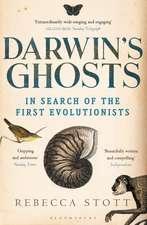How Homo Became Sapiens: On the evolution of thinking
Autor Peter Gärdenforsen Limba Engleză Paperback – 12 ian 2006
Preț: 363.13 lei
Preț vechi: 501.29 lei
-28% Nou
Puncte Express: 545
Preț estimativ în valută:
69.48€ • 72.55$ • 57.51£
69.48€ • 72.55$ • 57.51£
Carte tipărită la comandă
Livrare economică 24-31 martie
Preluare comenzi: 021 569.72.76
Specificații
ISBN-13: 9780198528517
ISBN-10: 0198528515
Pagini: 256
Ilustrații: numerous line illustrations
Dimensiuni: 156 x 233 x 20 mm
Greutate: 0.41 kg
Editura: OUP OXFORD
Colecția OUP Oxford
Locul publicării:Oxford, United Kingdom
ISBN-10: 0198528515
Pagini: 256
Ilustrații: numerous line illustrations
Dimensiuni: 156 x 233 x 20 mm
Greutate: 0.41 kg
Editura: OUP OXFORD
Colecția OUP Oxford
Locul publicării:Oxford, United Kingdom
Recenzii
Gardenfors presents a wealth of thought-provoking information and discussion, with a well-argued viewpoint, in a clear style.
. . . well written and admirably succinct. Although it has an argument to make, it does so in a fair and evenhanded way. This would make a good introduction for anyone venturing into the evolution of mind literature for the first time.
. . . well written and admirably succinct. Although it has an argument to make, it does so in a fair and evenhanded way. This would make a good introduction for anyone venturing into the evolution of mind literature for the first time.














